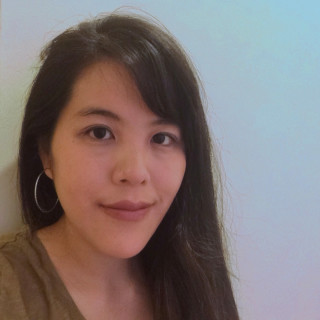
Daily, your mother sits near the window in your fourth-story room with her face made up, eyelashes mascara-ed black, lips colored pink. You’ve been here so long now that space is as completely yours as a sterile hospital room can be, with science-fiction books and unplayed video game boxes stacked in the corners, and uneaten Slim Jim’s and bags of Flaming Hot Cheetos sitting on the desk by the phone. On the cart closest to you is a pile of red Starbursts beside a bucket of creams and dressings for your thin, fragile skin.
We met about a year ago when you were fifteen and still going to school. You were sick at the time but not that sick — sick enough to be in the hospital, but not sick enough for your mother to constantly be at your bedside. I noticed one day while listening to the crackles in your lungs there was a pile of red Starburst candies on the table beside you. Laughing, I asked whether you were saving them because they were your favorite or quarantining them because they were your least favorite. You put down your Nintendo and told me you once teased your little sister by picking out all the red Starbursts from the pack. “The red ones are her favorite,” you said, grinning. Now, every time you were admitted to the hospital, your sister brought you red Starbursts.
Then, I didn’t see you for a couple of years, until a month ago when the Bone Marrow Transplant (BMT) team asked if I remembered who you were. Of course I recalled the red Starbursts and the lanky, brown-haired boy with a face full of freckles. My teenager with chronic granulomatous disease, right? We were starting to plan for his third transplant.
Now, you are a year older, a few inches taller, and many, many kilograms lighter. Your brown hair is gone. You can’t sit up. You’re too tired to speak. And, your mother is at your bedside. Constantly. At some point, I tell you through a blue mask that I remember your red Starbursts. Your mother laughs. You smile, then start coughing.
Conditioning: It’s the process prior to a bone marrow transplant when an array of drugs is given to empty the recipient’s “old” and “unhealthy” immune system in preparation for the donor’s “new” and “healthy” immune cells. I’ve spoken these two sentences so many times while teaching medical students about how I think about our patients in the BMT unit. One seemingly simple sentence that slides off my tongue as if conditioning were nothing.
But, conditioning makes you feel sicker. Destroying your current immune system in preparation for your transplant means that you temporarily have no immune system at all. For the past month up to now, you have had no white blood cells and your neutrophil count is a big empty zero. It means you’re susceptible to getting all sorts of infections. It means we’re worried you already have all sorts of infections. It’s why you’re in an isolation room. It’s why we all have to wear masks and gowns, why we limit visitors, why there’s a small antechamber I have to enter before I enter your actual room.
It also means fever and chills and endless nausea and vomiting. The inside of your mouth is completely covered in bloody yellow sores and it is so painful you’re now being fed through a central line. Over the following weeks, you start to have more trouble breathing, needing more and more oxygen, beginning with just 1/8 liter by nasal cannula, eventually working up to 4.5 liters by facemask. Your chest x-rays look worse every morning with more white and less grey. You get profuse diarrhea, and soon the diarrhea becomes bloody. You receive regular blood and platelet transfusions because it’s not just your white cells that are gone. Your other lines — the red blood cells, the platelets — they are also dropping. We treat you for everything we can think of and put you on an array of broad-spectrum antibiotics, anti-fungals, and even antivirals.
But, as you get sicker and sicker and as your transplant date approaches closer and closer, my department of Infectious Diseases and the BMT team start to have daily prolonged conversations about whether we should even proceed with your third transplant. You wouldn’t make it without your third transplant. But, would you make it even with your third transplant? And, would you even make it to your third transplant?
We don’t have a right answer. There often is no right answer.
Day 0: Transplant Day
The first thing I do when I get to the hospital at around 7 a.m. is check on your labs. I stand over my desk chair, clicking my way through your chart with my tote bag still slung over my shoulder. Not in the ICU. Good. Still on 4.5 liters of oxygen. Okay. Not great labs, but stable, which is reassuring. Relieved, I finally sit down, put my belongings away and walk over to your floor. Your nurse is with another patient, and because I am overly eager I forego checking in with her and get dressed up in the yellow gown, put on my blue mask, and enter your room. I’m smiling beneath my mask.
Your mother sits near the window, like she always does, but her face is drawn, and I see that she’s forgotten to put on her mascara and lipstick. I assume she must be worried about whether or not your body will take to the transplant. It’s your third one after all, and we rarely go past three. Plus, it’s a haplo, not a full match. And the donor is your father, who is in his late 60s. Your mother says “good morning” to me with less energy than usual, and I attribute the difference in her demeanor to nervousness. It’s something I will continue to regret and obsess over for many years after — the way I carelessly tossed those observations aside.
“So,” I say to her, “transplant today…!” You sleep quietly on the bed behind me, multiple IV bags hanging on the metal pole beside you, plastic tubing wrapped around your face delivering oxygen to your lungs, the lights of the IV pump flickering green. You look as if you’re sleeping deeply, but it’s mostly exhaustion and the effects of your pain medications you’re getting.
Your mother look at me and says, “It’s been canceled, Evelyn.”
Your mother and I know each other very well by now. She knows that I know your history. She knows that I come see you every morning around 7 a.m. She knows that I’m off on the weekends. She knows what questions to ask me and she often anticipates what I will tell her even before I begin. She knows my name and uses it when I have a medical student with me: So, are you following Evelyn, today? Evelyn’s great, you’ll learn a lot. But, she’s never used my name that directly, that pointedly, that meaningfully.
It’s been canceled, Evelyn.
I inhale so hard the blue mask sticks to my mouth and I feel a sudden sharp pain in my chest. Slowly sitting down beside your mother, I calmly ask her what had happened. Your dad went to the hospital this morning to donate, she tells me, but at the last minute, the transplant team felt it would be too risky. He’s over 60 years-old and has diabetes and high blood pressure and a bad heart. I mean, you know that. We all knew that. But, they said he was fine to donate. They wouldn’t do it, Evelyn, it’s not going to happen.
I’ve never seen your mother cry or tear up in the years that we’ve known each other, even during the worst of times when your blood pressure was dropping and you were having chills so severe the bed was shaking. But, her eyes become moist now. I put my blue-gloved hand on your mother’s arm, and we simply sit there quietly, watching your thin chest rise and fall under the white hospital sheets.
Evelyn Lai is a pediatric nurse practitioner as well as a 2018–2019 Doximity Author.







